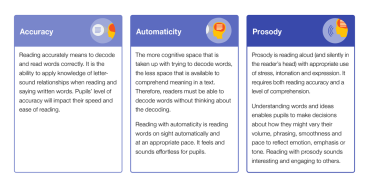Key Stage 2 (KS2) Reading Fluency Project: the importance of teaching fluency
Many struggling readers in upper key stage 2 lack the fluency required to extract meaning from age-related texts. While they may have passed the Phonics Screening Check at key stage 1 (KS1), their accuracy and automaticity no longer allow them to decode at a sufficient rate to approach more challenging texts with fluency and, as a consequence, their ability to comprehend the text is weakened. Their cognitive load is burdened with the demands of crunching through the words on the page, and other errors can appear such as skipping over words or making substitutions. As a result, there is little cognitive space left for comprehending demanding texts. Moreover, they lack the prosody needed to make sense of the words and phrases they are reading. The cumulative effect of the challenges they face can be demoralising, putting pupils off getting the practice they require to improve.
Read the Reading Fluency Glossary produced in collaboration between the Education Endowment Foundation (EEF) and HFL Education for more detail on the terms ‘accuracy’, ‘automaticity’ and ‘prosody’.
For a more detailed description of the terms used in the Key Stage 2 (KS2) Reading Fluency Project, read our blog ‘Reading Fluency: how do I teach that?’
The reading fluency elements - Penny Slater, Education Development and Partnership Lead (Primary English specialist)
Key Stage 2 (KS2) Reading Fluency Project: core teaching strategies
The Key Stage 2 (KS2) Reading Fluency Project skilfully incorporates the strategies of modelled expressive reading, echo reading, repeated reading, performance reading, text marking, challenging text selection and modelling comprehension skills, to improve the trajectory of Year 5/6 pupils towards the Expected Standard in reading at the end of key stage 2.
Precise assessment data is collected at the start and end of the 8-week project for participating pupils so accelerated progress can be clearly tracked and celebrated.
For a more detailed description of some of the strategies used in the Key Stage 2 (KS2) Reading Fluency Project and links to academic research that informed our approach, read our blog ‘A field guide to reading fluency: a reader's digest of our work to date’,


